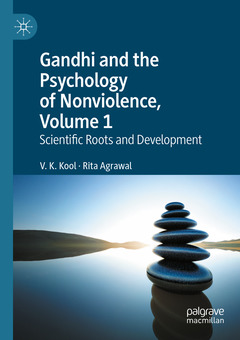Gandhi and the Psychology of Nonviolence, Volume 1, 1st ed. 2020 Scientific Roots and Development
Auteurs : Kool V. K., Agrawal Rita

Provides an in-depth understanding of Gandhi's philosophy and practice of nonviolence
Analyzes the success of Gandhian practice through the lens of modern scientific psychology
Demonstrates how Gandhi’s thinking and practice can be used to advance psychology and the field of nonviolence
Draws on the latest research in social neuroscience, psychometric measurement, social and cognitive psychology.
Date de parution : 11-2021
Ouvrage de 335 p.
14.8x21 cm
Disponible chez l'éditeur (délai d'approvisionnement : 15 jours).
Prix indicatif 116,04 €
Ajouter au panierDate de parution : 11-2020
Ouvrage de 335 p.
14.8x21 cm
Disponible chez l'éditeur (délai d'approvisionnement : 15 jours).
Prix indicatif 116,04 €
Ajouter au panierThèmes de Gandhi and the Psychology of Nonviolence, Volume 1 :
Mots-clés :
Gandhi; Nonviolence; social neuroscience; Evolutionary Psychology; Political Psychology; Social Identity Theory; cognitive psychology; Passive Resistence; Indian Psychology; Integrative power; Multidimensional Scale of Nonviolence (MSN); Indigenous Psychology; social justice; social protest; test of non-violence (NVT); social-cognitive neuropsychology; psychology of wisdom; the Pacifism Scale; models of nonviolence; personality and individual differences



